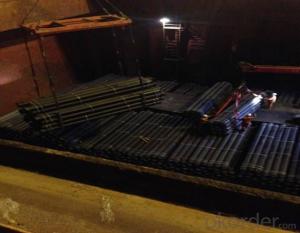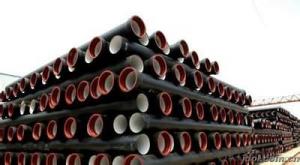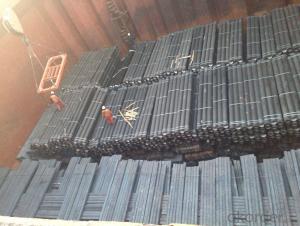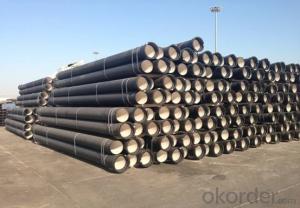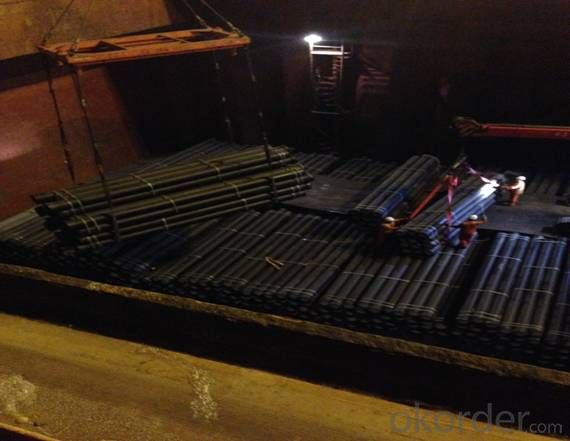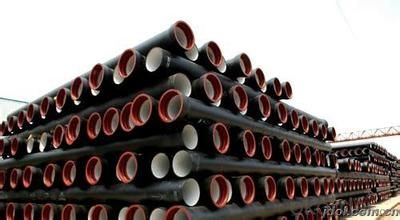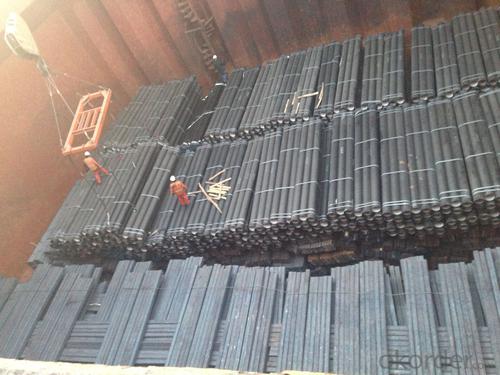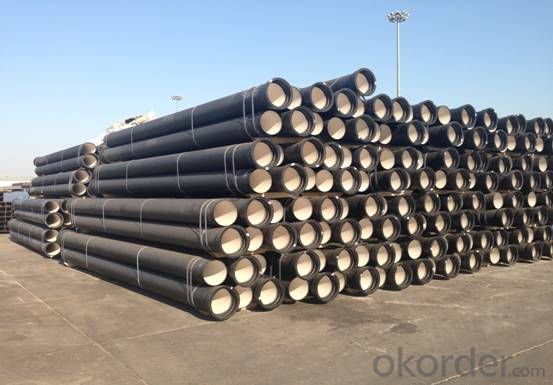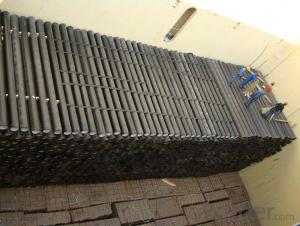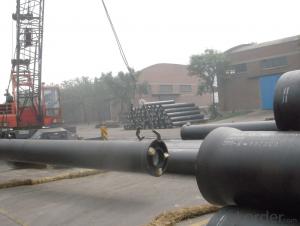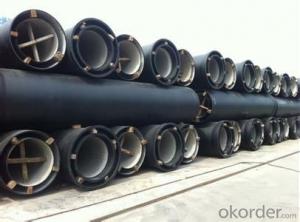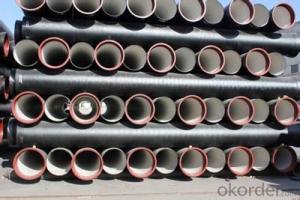DUCTILE IRON PIPE K8 DN500
- Loading Port:
- China Main Port
- Payment Terms:
- TT OR LC
- Min Order Qty:
- -
- Supply Capability:
- -
OKorder Service Pledge
OKorder Financial Service
You Might Also Like
Ductile Iron Cast Pipe is without any defects compare with tradition casting tech, which has many advantages particularly as follow:
(1) High density. In the "vertical upward casting" process, the melt iron of centre liquid column in center crystallizer is continuously feeding for volume shrinkage caused by condensation tube at outer circumference , which lead to be free of shrinkage porosity.
(2) High purity. When melt iron pouring, the mixed impurities such as gas, dross, sand grain which are lighter than melt iron could be eliminated at furnace mouth, its impossible to enter into the crystallizer through the channel, so the melt iron into the crystallizer is very pure.
(3) Strength with toughness. The cooling speed provided by continuous crystallizer is 30 times than sand casting and 5 times than centrifugal casting, and doesn't produce white iron, the eutectic cell volume of continuous cast iron is one eighth to one tenth compare with traditional cast iron. The density of graphite nodule in ductile iron can reach 300-700 pcs/mm2. Therefore, all reason above improve the strength and toughness of continuous cast iron.
(4) Free machining. The high speed cooling make the hardening phase (such as boride, steadite) not appear like reticular, massive or thick, but diffuse like fish bone and pane in shape, moreover, there are tiny graphite flakes inlaid hardening phase. It's free machining in BrinellHardness the range of 250-300HB. However, the Brinell Hardness of 250 is top limit to common metal materials.
(5) Uniform composition of tube wall. The convection mixing of liquid column caused by marching type drawing in crystallizer make the composition of tube wall well-distributed, and concentration gradient very little.
(6) High productivity. To the wall thickness of tube under 10mm, the speed of continuous casting is 1 meter/min, to the wall thickness of tube under 20mm, the speed of continuous casting is 0.5 meter/min, which is high efficiency that centrifugal or other casting tech couldn't reach.
- Q: Can ductile iron pipes be used in high-pressure applications?
- Yes, ductile iron pipes can be used in high-pressure applications. Ductile iron pipes are known for their strength and durability, making them suitable for handling high-pressure fluids or gases. They have a higher pressure rating compared to other types of pipes, such as PVC or HDPE pipes. Ductile iron pipes also have excellent resistance to external loads and are capable of withstanding high internal pressures. These pipes are commonly used in water and wastewater systems, as well as in industrial applications where high-pressure conditions are present. It is important, however, to ensure that the ductile iron pipes used in high-pressure applications meet the required standards and specifications to ensure their safe and reliable operation.
- Q: Are ductile iron pipes suitable for use in paper mills?
- Yes, ductile iron pipes are suitable for use in paper mills. Ductile iron is known for its high strength and durability, making it an excellent choice for various industrial applications, including paper mills. These pipes can withstand high-pressure systems and are resistant to corrosion, making them suitable for transporting water, chemicals, and other fluids commonly used in paper mills. Additionally, ductile iron pipes have good impact resistance, which is beneficial in an environment where heavy machinery and equipment are often present. Overall, ductile iron pipes are a reliable and long-lasting option for paper mills due to their strength, durability, corrosion resistance, and ability to handle high-pressure systems.
- Q: Are ductile iron pipes suitable for use in acidic environments?
- Highly acidic environments are generally unsuitable for the use of ductile iron pipes. While ductile iron is recognized for its strength and durability, it does have limitations in acidic conditions. Over time, acidic environments tend to corrode and deteriorate ductile iron pipes. Corrosion occurs when the acid in the environment reacts with the iron in the pipe, eventually leading to pipe failure. The rate at which corrosion occurs depends on several factors, including the concentration and type of acid, temperature, and duration of exposure. Acidic environments with pH levels below 4 or 5 can significantly accelerate the corrosion process. To address this limitation, alternative materials such as stainless steel or corrosion-resistant alloys like PVC or HDPE pipes are often recommended for use in acidic environments. These materials exhibit superior resistance to corrosion and can withstand the harsh conditions associated with acidic environments. However, it is worth noting that ductile iron pipes may still be suitable for use in mildly acidic conditions or if protective measures are implemented to prevent corrosion. The application of protective coatings or linings to the pipes can help minimize the corrosive effects of acids. Consulting experts or engineers who are knowledgeable about the specific conditions and requirements of the project is crucial in determining the most appropriate material for use in acidic environments.
- Q: Are ductile iron pipes suitable for bridge piers or abutments?
- Yes, ductile iron pipes are suitable for bridge piers or abutments. Ductile iron is a strong and durable material that is widely used in various infrastructure projects, including bridges. It has excellent mechanical properties, including high tensile strength and impact resistance, making it capable of withstanding heavy loads and external forces. Additionally, ductile iron pipes are highly resistant to corrosion and have a long service life, which is crucial for structures like bridge piers or abutments that are exposed to harsh environmental conditions. The versatility and reliability of ductile iron pipes make them a suitable choice for supporting and reinforcing bridge structures, ensuring their safety and longevity.
- Q: DN300 what's the price of the ductile iron pipe / the weight and the price of one meter?
- The annealed ductile iron pipe is composed of ferrite and pearlite. The mechanical properties of the ductile iron pipe are better.
- Q: Can the underground cast iron pipes be connected with clamps to form buttress?
- The clamp hoop is a connecting device for connecting pipe fittings, valves and pipe fittings with grooves. Used in the fast joint between the role of tightening, the general two joints with gaskets, rubber, and silicone, ptfe.
- Q: The difference between ductile iron pipe and steel pipe used in pipe jacking
- Comparison between ductile iron pipe and universal cast iron pipe: the process of making ductile iron pipe is cast by adding alkaline earth metal or rare metal such as magnesium and calcium in the raw material of common cast iron pipe.
- Q: What is the average cost of ductile iron pipe?
- The average cost of ductile iron pipe can vary depending on factors such as the size, length, and location. However, as of 2021, the average cost for ductile iron pipe ranges from $10 to $20 per linear foot.
- Q: What kind of joints are used with ductile iron pipe?
- The most commonly used joints with ductile iron pipe are push-on joints and restrained joints.
- Q: Are ductile iron pipes resistant to environmental stress cracking?
- Yes, ductile iron pipes are highly resistant to environmental stress cracking.
Send your message to us
DUCTILE IRON PIPE K8 DN500
- Loading Port:
- China Main Port
- Payment Terms:
- TT OR LC
- Min Order Qty:
- -
- Supply Capability:
- -
OKorder Service Pledge
OKorder Financial Service
Similar products
Hot products
Hot Searches
Related keywords
